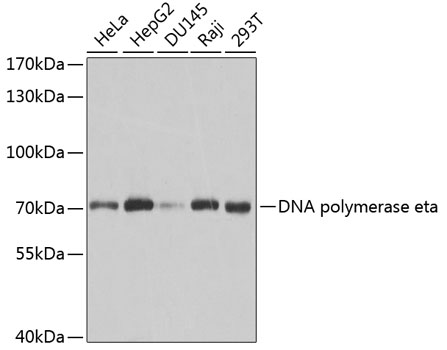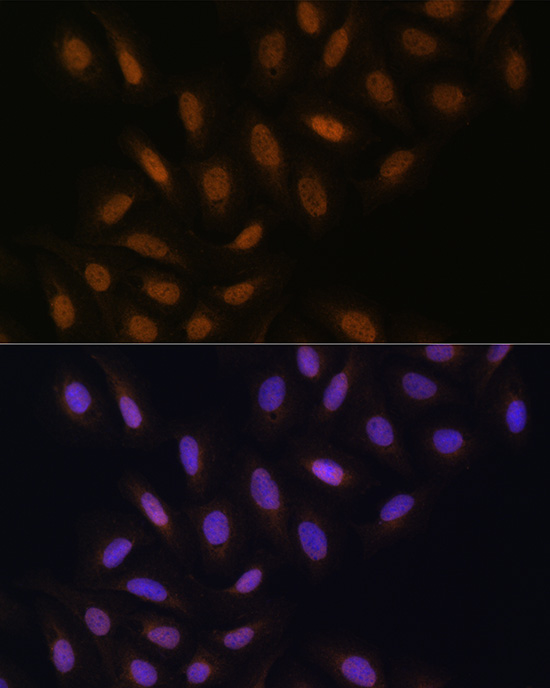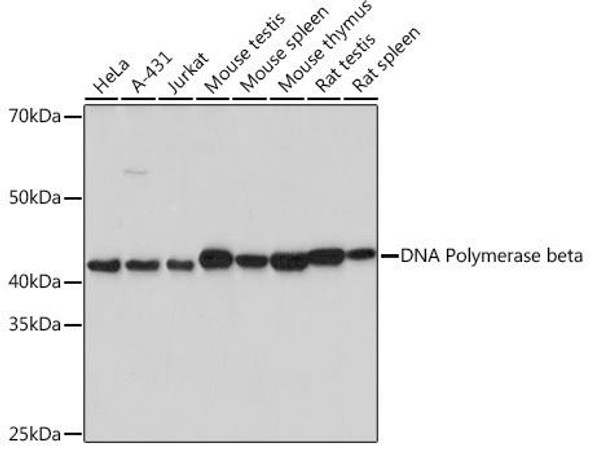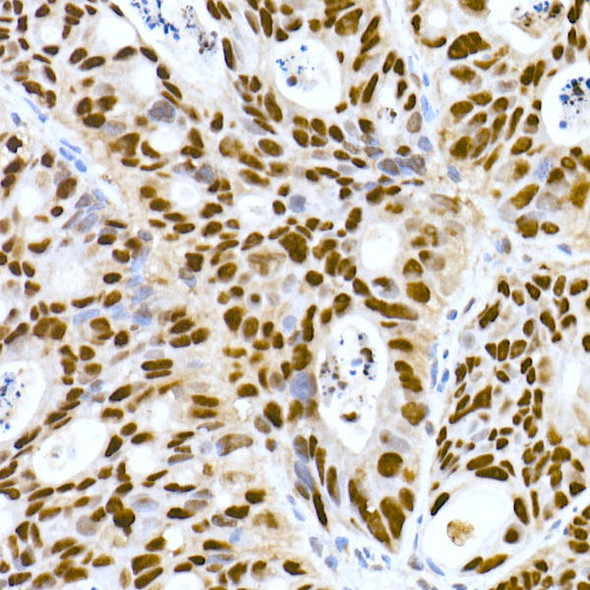Epigenetics & Nuclear Signaling Antibodies 3
Anti-DNA polymerase eta Antibody (CAB1833)
- SKU:
- CAB1833
- Product Type:
- Antibody
- Reactivity:
- Human
- Reactivity:
- Mouse
- Reactivity:
- Rat
- Host Species:
- Rabbit
- Isotype:
- IgG
- Research Area:
- Epigenetics and Nuclear Signaling
Description
| Antibody Name: | Anti-DNA polymerase eta Antibody |
| Antibody SKU: | CAB1833 |
| Antibody Size: | 20uL, 50uL, 100uL |
| Application: | WB IF |
| Reactivity: | Human, Mouse, Rat |
| Host Species: | Rabbit |
| Immunogen: | Recombinant fusion protein containing a sequence corresponding to amino acids 20-320 of human DNA polymerase eta (NP_006493.1). |
| Application: | WB IF |
| Recommended Dilution: | WB 1:500 - 1:2000 IF 1:50 - 1:200 |
| Reactivity: | Human, Mouse, Rat |
| Positive Samples: | HeLa, HepG2, DU145, Raji, 293T |
| Immunogen: | Recombinant fusion protein containing a sequence corresponding to amino acids 20-320 of human DNA polymerase eta (NP_006493.1). |
| Purification Method: | Affinity purification |
| Storage Buffer: | Store at -20'C. Avoid freeze / thaw cycles. Buffer: PBS with 0.02% sodium azide, 50% glycerol, pH7.3. |
| Isotype: | IgG |
| Sequence: | QVEQ RQNP HLRN KPCA VVQY KSWK GGGI IAVS YEAR AFGV TRSM WADD AKKL CPDL LLAQ VRES RGKA NLTK YREA SVEV MEIM SRFA VIER ASID EAYV DLTS AVQE RLQK LQGQ PISA DLLP STYI EGLP QGPT TAEE TVQK EGMR KQGL FQWL DSLQ IDNL TSPD LQLT VGAV IVEE MRAA IERE TGFQ CSAG ISHN KVLA KLAC GLNK PNRQ TLVS HGSV PQLF SQMP IRKI RSLG GKLG ASVI EILG IEYM GELT QFTE SQLQ SHFG EKNG SWLY AMCR GIEH DPVK PRQL PKTI G |
| Gene ID: | 5429 |
| Uniprot: | Q9Y253 |
| Cellular Location: | Nucleus |
| Calculated MW: | 46kDa/78kDa |
| Observed MW: | 70kDa |
| Synonyms: | POLH, RAD30, RAD30A, XP-V, XPV |
| Background: | This gene encodes a member of the Y family of specialized DNA polymerases. It copies undamaged DNA with a lower fidelity than other DNA-directed polymerases. However, it accurately replicates UV-damaged DNA; when thymine dimers are present, this polymerase inserts the complementary nucleotides in the newly synthesized DNA, thereby bypassing the lesion and suppressing the mutagenic effect of UV-induced DNA damage. This polymerase is thought to be involved in hypermutation during immunoglobulin class switch recombination. Mutations in this gene result in XPV, a variant type of xeroderma pigmentosum. Several transcript variants encoding different isoforms have been found for this gene. |
| UniProt Protein Function: | POLH: DNA polymerase specifically involved in DNA repair. Plays an important role in translesion synthesis, where the normal high fidelity DNA polymerases cannot proceed and DNA synthesis stalls. Plays an important role in the repair of UV-induced pyrimidine dimers. Depending on the context, it inserts the correct base, but causes frequent base transitions and transversions. May play a role in hypermutation at immunoglobulin genes. Forms a Schiff base with 5'-deoxyribose phosphate at abasic sites, but does not have lyase activity. Targets POLI to replication foci. Interacts with REV1. Interacts with monoubiquitinated PCNA, but not unmodified PCNA. Interacts with POLI. Belongs to the DNA polymerase type-Y family. 2 isoforms of the human protein are produced by alternative splicing. |
| UniProt Protein Details: | Protein type:Transferase; EC 2.7.7.7; DNA repair, damage Chromosomal Location of Human Ortholog: 6p21.1 Cellular Component: nucleoplasm; cytoplasm Molecular Function:protein binding; metal ion binding; damaged DNA binding; DNA-directed DNA polymerase activity Biological Process: regulation of DNA repair; DNA synthesis during DNA repair; postreplication repair; pyrimidine dimer repair; DNA repair; DNA replication; response to UV-C Disease: Xeroderma Pigmentosum, Variant Type |
| NCBI Summary: | This gene encodes a member of the Y family of specialized DNA polymerases. It copies undamaged DNA with a lower fidelity than other DNA-directed polymerases. However, it accurately replicates UV-damaged DNA; when thymine dimers are present, this polymerase inserts the complementary nucleotides in the newly synthesized DNA, thereby bypassing the lesion and suppressing the mutagenic effect of UV-induced DNA damage. This polymerase is thought to be involved in hypermutation during immunoglobulin class switch recombination. Mutations in this gene result in XPV, a variant type of xeroderma pigmentosum. Several transcript variants encoding different isoforms have been found for this gene. [provided by RefSeq, May 2014] |
| UniProt Code: | Q9Y253 |
| NCBI GenInfo Identifier: | 59798441 |
| NCBI Gene ID: | 5429 |
| NCBI Accession: | Q9Y253.1 |
| UniProt Related Accession: | Q9Y253 |
| Molecular Weight: | |
| NCBI Full Name: | DNA polymerase eta |
| NCBI Synonym Full Names: | DNA polymerase eta |
| NCBI Official Symbol: | POLH |
| NCBI Official Synonym Symbols: | XPV; XP-V; RAD30; RAD30A |
| NCBI Protein Information: | DNA polymerase eta |
| UniProt Protein Name: | DNA polymerase eta |
| UniProt Synonym Protein Names: | RAD30 homolog A; Xeroderma pigmentosum variant type protein |
| Protein Family: | DNA polymerase |
| UniProt Gene Name: | POLH |
| UniProt Entry Name: | POLH_HUMAN |
View AllClose








